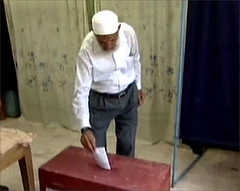Democracy promotion: three fallacies
Oct 14th, 2008 by MESH
From Michele Dunne
 Can the United States still promote democracy in the Arab countries?
Can the United States still promote democracy in the Arab countries?
There are three misguided assumptions and assertions circulating in discussions on this question:
- The United States has contaminated the idea of democracy in the Middle East and now Arabs do not want democracy because it is connected with U.S. policy.
- It is not possible for the United States to pursue democracy promotion and work with Arab governments on regional peace and security at the same time; we have to choose between the two.
- If a new U.S. administration pursues democracy promotion in the Middle East at all, it should focus on developing the institutions of democracy rather than pushing for early elections.
In what ways are these three notions misguided?
• Contamination of democracy. Certainly U.S. actions in the Middle East in recent years have caused a spike in anti-U.S. sentiment in the Middle East, although even there I would caution that it is by no means a new phenomenon. As a former U.S. diplomat, I remember well being beaten up for alleged U.S. bias during the 1980s and 1990s. But the question is whether U.S. actions—including the invasion of Iraq—have turned Arabs against democracy.
While Arab government officials and pundits often say so, public opinion data say otherwise. Have a look at the analysis of data from the Arab Barometer Project presented in a new article entitled “Has the United States Poisoned Democracy?” by Amaney Jamal and Mark Tessler. Correlating polling data on support for democracy—as high in Arab countries as in any other region of the world—with anger at the United States, the authors conclude that “our data do not support the argument that Arab popular support for democracy has been undermined, and the concept itself has been discredited, by the anti-Americanism that results from Arab complaints about U.S. foreign policy.”
Further, those of us who study the region and visit frequently have found a shift in the debate about political systems. Ten or twenty years ago, we indeed heard many debates about whether democracy was compatible with Islam, consonant with Arab culture, or an imposition of Western imperialism. Nowadays such debates are over, and when you still hear such arguments, generally it is from an older person or from someone who is part of or connected to the ruling establishment. Islamists, leftists, and others who once made such arguments have moved beyond them to an acceptance of democracy, though they might have a certain character or spin they would like to put on it. But my point here is that, whatever sins the United States might have committed in the Middle East, turning the Arabs against democracy has not been one of them.
• Pursuing democracy and security interests. Clearly the United States has many items on its agenda with Arab countries, and promoting democracy is only going to be one of them. Can we pursue more than one interest at once? I think the key point here is how far we expect the U.S. government to push democracy promotion. If the United States government were lending its support to dissidents who were an immediate challenge to regime—in other words, if the ruling group believes they are in immediate danger of losing power—then that ruling group most likely would not cooperate with the United States.
But the United States has not adopted a policy of regime change toward most Arab countries; rather it is promoting gradual change along the lines of increased media freedom, civil society freedom, judicial freedom, freer and fairer elections, etc. There are very few countries in which the opposition is even strong enough to attempt to take over—Palestine and Lebanon come to mind, and the United States is not inclined to ally itself with those opposition movements. While the sort of incremental democracy promotion that the United States generally does might annoy Arab governments at times, it will not stop them from cooperating with us on shared interests. Egypt, for example, never ceased cooperation with the United States on military affairs, counter-terrorism, or Arab-Israeli diplomacy during the time (2004-05) in which the US had quite an active democracy promotion program there.
• Institutions rather than elections. Building up the institutions of democratic government and a democratic society is a critical part of any democracy promotion strategy. But I am troubled by the suggestion that the United States should stop promoting free and fair elections, which springs from the traumatic experience of the Hamas victory in Palestine in 2006.
First, a strategy of institutional development without political competition is doomed to failure, because in most cases autocrats do not create institutions that will limit their power unless they are compelled to do so by opposition forces. (For more on this, see the article entitled “How Democracies Emerge: the Sequencing Fallacy,” by my colleague Tom Carothers.) The enlightened dictator who makes a gift of democracy to his country is a rare commodity. Political competition and the development of sound and empowered institutions reinforce each other.
Second, the fact is that nearly all Arab states (except Libya) are holding elections of one kind or another on a regular basis, with no pushing from the United States. So the real dilemma for the next administration will not be whether or not to push Arabs to hold elections, but whether to encourage them to make the elections that they will hold freer and fairer.
Michele Dunne made these remarks at a symposium on “After Bush: America’s Agenda in the Middle East,” convened by MESH at Harvard University on September 23.
 Posts+Comments
Posts+Comments Posts+Comments
Posts+Comments Posts+Comments
Posts+Comments Posts+Comments
Posts+Comments